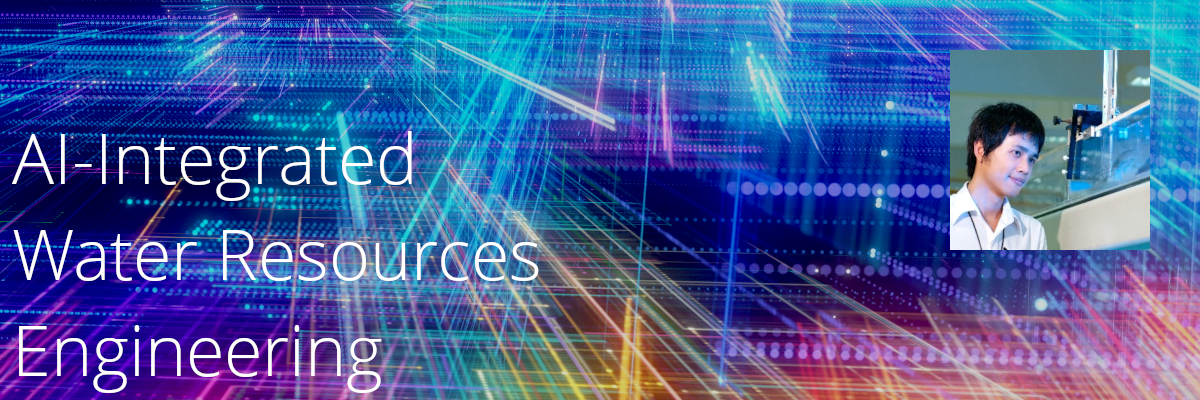AI-Integrated Water Resources Engineering

AI-Integrated Water Resources Engineering prepares engineers to manage one of the world’s most precious and threatened resources: water. From predicting floods in urban drainage systems to modeling groundwater flow and reservoir operations, AI enables smarter decisions for a climate-challenged future.Students will learn how to integrate hydrological modeling, environmental sensing, and machine learning to solve complex problems — with real datasets and real-world impact.
Program Overview
This track is part of the AI-Integrated Engineering Program (AIEP) and is offered as a standard program under the Department of Water Resources Engineering.
- Bachelor’s Program: B.Eng. in Water Resources Engineering
- Master’s Program: M.Eng. in AI-Integrated Engineering (Regular Thai curriculum)
- First intake: Academic Year 2027
- Number of Students: 10
- Admission Channels: TCAS1 (Portfolio), TCAS2 (Quota)
- Not available in regular or IUP tracks
Program Highlights
- First and Only in Thailand: The country’s pioneering program integrating Water Resources Engineering with Artificial Intelligence (AI) and Data Science.
- Learn from Leading Experts: Taught by top faculty and researchers, with guest lecturers from tech companies and national water agencies.
- Hands-On with Real Data: Experience real-world problem-solving through workshops, labs, and projects using real water data.
- Strong Networks: Build valuable connections with industry leaders, research institutes, and international partners.
What You’ll Learn
Students will develop expertise in core water engineering fundamentals, including hydrology, hydraulics, irrigation, and drainage design, providing the essential foundation for understanding water systems and infrastructure. The program integrates comprehensive data science and AI education, covering Python programming, databases, machine learning, deep learning, and predictive modeling specifically tailored for water resources applications.
The curriculum teaches AI for water solutions, including AI-driven forecasting of floods and droughts, smart dam and reservoir operations, and advanced water loss detection systems. Students will master smart water technologies, learning to utilize IoT sensors, drones, and satellites for comprehensive water monitoring and analysis, enabling real-time assessment and management of water resources.
The program also emphasizes policy and sustainability aspects, covering water governance, climate change impacts, and sustainable water resource development. This holistic approach ensures graduates can address technical challenges while understanding the broader policy and environmental context necessary for effective water resource management in a changing climate.
Sample Capstone and Research Topics
- Flood forecasting using satellite/radar + machine learning
- Real-time community-based flood early-warning platforms
- Drone-based water quality assessment with AI analytics
- AI models for predicting reservoir inflows using satellite imagery
Industry & Research Partners
- Tech Companies: Collaborations with leaders in AI, cloud computing, and data analytics.
- Government Agencies: Partnerships with the Royal Irrigation Department, Metropolitan/Provincial Waterworks, and National Water Resources Office.
- Private & Industrial Sector: Joint solutions with engineering consultancies, industrial estates, and modern agriculture.
- International Research Institutes: Knowledge exchange and co-research with global universities and research centers.
4+1 Pathway
- Students must meet academic requirements by their 3rd year by taking AI foundational courses.
- Students start enrolling Master’s courses also in the 4th year. (See information for the M.Eng in AI-Integrated Engineering program.)
- 4th-year project linked to Master’s research in the 5th year.
- Two degrees (B.Eng. + M.Eng.) in 5 years for future professionals.
The detailed study plan will be available soon. Read more about the undergraduate AI core courses and the Master program.
Career Opportunities
- Engineers specializing in AI-powered water management.
- Developers of water systems and Digital Twin models.
- Data scientists for water-related solutions.
- Experts in smart water systems in the government and private sectors.
- Climate change impact modelers for water resources.
- Consultants in water technology and innovation.
Competitive Advantages
- Future-Proof Skills: Dual expertise in water engineering and AI, highly sought after worldwide.
- Real-World Readiness: Designed to solve real problems—not just textbook knowledge.
- Strong Portfolio: Graduates leave with impactful projects that showcase their abilities.
- Broad Career Paths: Opportunities in both the engineering and digital technology sectors.
- Higher Earning Potential: Specialized graduates in high demand with premium career prospects.
Enrichment Activities
- Project-based learning with real-time water and environmental data.
- Training camps on rainfall–runoff simulation with AI.
- Field trips to dams, treatment plants, and smart water operation centers.
- Exchange and research opportunities at partner universities abroad.
- Joint projects with AI and environmental research teams.
AI Foundation Courses (Undergraduate Level)
Students will take the following courses during their first 3 years as undergradute students.
- Applied AI for Engineering (01204162)
- Mathematical Foundations for AI Engineers (course under development)
- Programming Concepts for Data Processing and Analysis (course under development)
See course descriptions.
Equivalent internal courses from Water Resources Engineering may be submitted for equivalency review.
Distinctive Graduate Outcomes
Graduates of this program will be able to:
- Harness data and AI to analyze and solve complex water challenges.
- Develop innovative solutions and technologies for a sustainable water future.
- Work at the intersection of engineering and data science.
- Adapt to rapid technological change in the 21st century.
- Lead smart water management in the face of climate change.
- Collaborate across disciplines to deliver large-scale water projects.
- Understand global water challenges and contribute to real solutions.